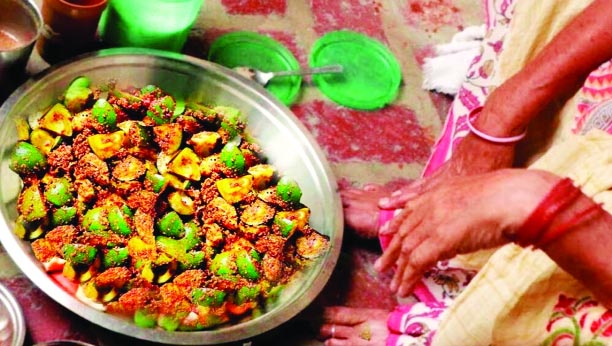Sumedha Manhas
The orange hue of the dying sun creeps in through the faults in the curtain. The setting sight brought out the deepest contemplations as the quiet hum of conversations put me at ease. After a lazy Sunday lunch, whose odor still lingered in the air, mingling with the fragrance of mustard oil, my sight fell upon Nani (my grandmother) who sat on a bamboo stool on the balcony, soothing my brother’s scalp as she balanced a comb between her dentures.
For most of the time in my adolescence, I wanted to be in the vicinity of my father’s pedantic echoes. But as time wrapped its gentle fingers around me, every woman in my family, myself included, became intertwined by a common, tender passion. The fragments of each of our hearts were bounded by invisible strings of compassion and care, speaking volumes in their quiet,
intimate language. For me, love lay in the simplicity of handmade gifts-birthday cards adorned with short poems or flipbooks crafted from careless doodles. My mother’s love was palpable in the soft caress of her dupatta against my skin and the warm breath that accompanied it, nursing my pricked eye. For my nani, it was achaar (pickle).
Barefoot at sixty-eight, her ankle tainted by fissures, a poetic fusion of her life’s vigor and nature’s artistry; with her wardrobe full of muted, chiffon sarees and mid-length blouse pieces to wear on the body she knows only to hate; Nani stands for hours picking out mangoes, which she sprawls on a plastic sheet, basking them in the sun’s warmth. She gathers fiery chills and mustard seeds in vessels crafted by Earth herself and the curry leaves which she slyly pocketed from the neighbor’s garden, a small act of defiance after the vegetable vendor ceased providing them for free. She adds to that, salt- the silent sorcerer dancing with the sweet siren of jaggery as garlic surrenders its pungent essence and yields a tangy and spicy bit of heaven, crafted by her withered fingers, gently and steadily- for according to nani, achaar making was not a task to rush through, it was a ritual to be savored.
Having studied till 8th grade, and getting married to my grandfather at the tender age of 17, fate claimed Nanu early, leaving Nani with countless unspoken words. She searches for the right words till day, coaxing her granddaughter into playing a DVD on her 1996 TV model. She watches Sleepless in Seattle with eyes that slowly well up as she finds a familiar English word in the subtitles. Beneath the star-clad sky, concealed by the ceiling with chipping paint – she is my Nani, but very much a woman lost in translation, awaiting a poet to tell her story.
So, as we sealed the achaar, the remnants of a half-peeled Dr. Oetker mayonnaise sticker clung to the glass; each jar was infused with love, stories, and tenderness that colored my seventeen years.
It dawned on me that my aspirations were not mine alone anymore, they were interwoven with the dreams of countless women, akin to my nani, who channel their fierce determination into preserving the traditions that define our cultural identity.
In a world fixated on measurable benchmarks, achaar making emerges as an art form, a skill that flourishes through human compassion and tenderness, and thrives on the passion of its creators, defying the confines of rigid empirical definitions. Its essence, rooted in love and patience,
evades quantification, reminding us that some things, like the delicate dance of flavors and memories, are best understood through the heart rather than numbers.
“Sumu, can you pen down this recipe for me before I forget it?” So in the hush of winter’s arrival, as the achaar jars began to empty, I nestled the oil-stained paper between the timeworn leaves of her journal, penning the title, ‘Achar Recipe’, with a doodle in the bottom.
Trending Now
E-Paper


